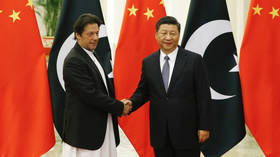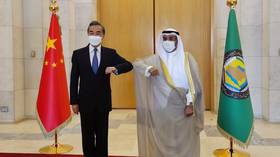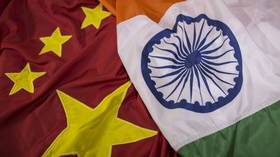Should India be alarmed by strengthening of China-Pakistan ties?

Prime Minister of Pakistan Imran Khan traveled to Beijing on Friday to attend the opening ceremony of the Winter Olympics. He also since met with Chinese leader Xi Jinping to sign a number of business deals to cement what is called “phase two” of the China-Pakistan Economic Corridor (CPEC), a significant aspect of the Belt and Road Initiative (BRI).
While some countries have become confrontational against China in a number of geopolitical areas, Islamabad is tilting closer to Beijing in a relationship which President Xi described earlier as one between “iron brothers.” Their nexus is fueled by a common antipathy towards India, and despite the vastly different ideologies of both countries.
“Pakistan and China not only see each other as iron brothers, but they also think that China and Pakistan’s relationship is as high as the Himalayas. It’s the people-to-people relationship,” Khan said in an interview with Global Times published on Sunday. He added that the relationship between the two nations will only “get closer and stronger” in the future, thanks to the CPEC.
The growing closeness of China and Pakistan recently prompted the Indian National Congress and opposition leader Rahul Gandhi to accuse Prime Minister Narendra Modi of having “brought the two countries together.”
Is Pakistan increasingly an ally of China? Does Khan’s visit mark Islamabad ultimately “taking sides” in what has been dubbed a new Cold War in the same way the media have framed Vladimir Putin’s visit to Beijing and the subsequent Sino-Russia statement? Both Beijing and Islamabad have found themselves with broadly overlapping strategic, economic and military interests. And Pakistan, in the bigger picture, also finds itself with few other options for transforming its jagged fortunes.
It has been for a long time, to put it mildly, a struggling country. With a GDP per capita of just $1,194 in 2020, Pakistan has wrestled with poverty, a rising population of over 220 million, and political instability exacerbated by ethno-sectarian conflict and terrorism. In addition to domestic troubles, the nation faces a patchy security environment externally, being locked in a longstanding antagonistic relationship with India, and Afghanistan sitting on its western frontier. This has created the dilemma of Pakistan being a poor country, yet one which is also a nuclear-weapon state with one of the largest armies in the world.
However, Pakistan’s geostrategic position has become essential to its northeastern neighbor, China. On a map, Pakistan is aligned on an almost diagonal trajectory connecting with China from the western Himalayas heading downwards into the Indian Ocean, and in close proximity to the Persian Gulf and the Arabian Peninsula. This route allows China to bypass the politically and militarily sensitive routes of the East and South China Seas and the Straits of Malacca, where the US is attempting to navally encircle them. On this geographic premise, China ultimately presented troubled Pakistan with an offer it could not refuse: to become the “spine” of the Belt and Road project through the CPEC, promising to transform its fortunes. While doing this, China has also given Pakistangrowing access to its enormous consumer market.
The CPEC project has pledged to build a plethora of infrastructure in Pakistan to try and turbocharge its development, but also to create a logistical means of safeguarding China’s westward trade. This includes proposed roads, railways, airports and the comprehensive development of energy infrastructure. One of its pinnacle projects is the development of Gwadar Port on the Arabian Sea in Balochistan province. However, this has been a struggling project with many questions posed about its success, and even talk of it ultimately being abandoned for Karachi. Yet, both sides insist this is not the case and made recommitments to it at the meeting on Friday. While there has been a persistently negative narrative pushed regarding the CPEC in general, many projects have likewise been finished, including nuclear power plants, a metro in Lahore, and a new national electric grid.
China and Pakistan also share close military cooperation. As Modi’s India has tilted towards the United States, and strategic antagonism with China has grown, Beijing perceives Pakistan as a counterweight for the purpose of containing New Delhi. Both countries collaborate on a joint fighter jet, while China is now supplying and building up Pakistan’s navy with frigates, showing Beijing’s intentions to keep the western Indian Ocean free from Indian domination. The United States, which once saw Pakistan as a strategic partner itself in pursuing the War on Terror, now increasingly sees Islamabad as a Chinese-aligned state in all but name. Last year,the US placed Pakistan military firms linked with China on its “entity list” – as it has done itself to many Chinese firms. Likewise, as it headed to the Olympics, Pakistan also skipped Joe Biden’s “democracy summit.” It has also become one of the most vocal supporters of China’s policies in Xinjiang.
Against such a backdrop, it is no wonder that politicians in India have become alarmed by the scale of China-Pakistan collaboration. Islamabad may have many internal problems, but it is still for all intents and purposes a formidable adversary. In aligning more closely with China, its goal is not to pursue a global struggle against the West, and is not looking to confront the US or its allies. Instead, it is intended to directly bolster its own hand in the longstanding regional struggle against India, while also giving itself a shot at attaining rapid economic development. The hard-line nationalist position of Modi and his decisions on Jammu and Kashmir have only made it harder for India to reconcile with Pakistan. This could well be a strategic mistake.
In conclusion, some say Pakistan is becoming too “dependent” on China, but that is ultimately down to the reality that there has been little else going for it. Pakistan is a country dogged with little economic prospects, instability and an insecure periphery. What other options and hope did Pakistan have otherwise? Hence, when the world’s second-largest economy and a growing military superpower comes along and offers the opportunity to receive the most comprehensive investment the country has ever got, as well as military assistance, how could it be turned down? Islamabad hopes the CPEC can be a gamechanger for its own fortunes – it’s a gamble in which it has little to lose.
The statements, views and opinions expressed in this column are solely those of the author and do not necessarily represent those of RT.
















